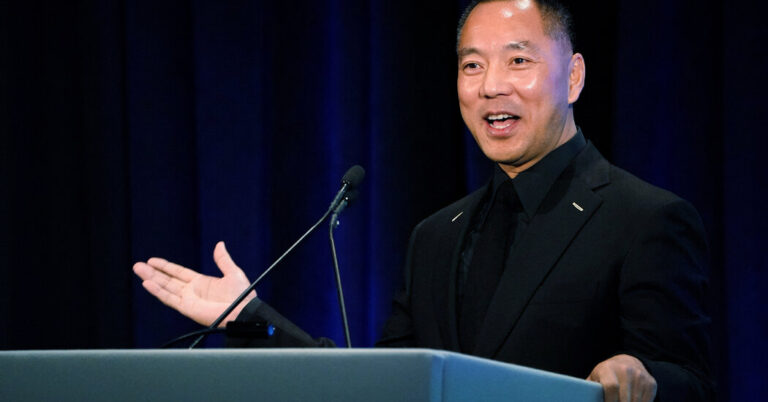Lawyers for Guo Wengui, the exiled Chinese billionaire indicted on charges of defrauding investors of more than $1 billion, argued on Friday that Guo was a staunch anti-Communist leader and had no need for the money he allegedly stole.
In opening statements at the trial in Manhattan federal court, Guo’s lawyer, Sabrina Shroff, argued that Guo would not cheat the thousands of supporters who have invested in his various businesses because doing so would undermine his efforts to topple the Chinese Communist Party.
That is “not only illogical, but also defies common sense,” Shroff said.
Guo, also known as Miles Kwok and Miles Guo, has been held in a federal detention center in Brooklyn since he was arrested in March 2023 at a Manhattan apartment valued at $68 million and charged with fraud and money laundering.
Prosecutors said Guo promised investors shares in his media company and cryptocurrency, but used the money to live a lavish lifestyle, including a yacht, a $4 million Bugatti sports car and a $26 million, 50,000-square-foot mansion in New Jersey.
“Miles Guo took investors’ money and used it for himself,” government prosecutor Micah Fergenson said in his opening statement. “Miles Guo perpetrated one massive fraud.”
In Beijing, Mr. Guo rose to become a wealthy property developer and allied himself with a powerful intelligence official who was detained by Chinese authorities before he fled to the United States nine years ago.
In 2017, Guo began speaking out against Chinese government officials on Twitter, YouTube and eventually through his own media company. His accusations angered the Chinese government, which announced it had issued an Interpol “red notice” arrest warrant for him. Guo was wanted in China on charges including bribery and rape.
During the Trump administration, Guo allied himself with members of the US right, including Steve Bannon, a former adviser to Trump, who stood beside Guo when he declared the establishment of a “New Federal State of China” on a ship in New York harbor in June 2020.
His anti-Communist stance has won him thousands of supporters around the world who are excited by the idea of a charismatic, wealthy former insider targeting China’s ruling party.
The government alleges that Guo persuaded loyalists to invest in him and then defrauded them. Some of those who lost money have come forward to testify against Guo. The government’s case also relies on testimony from Guo’s former employees, bank records and videos made by Guo, Fergenson said.
But prosecutors may also have to convince jurors on something more subtle: that Mr. Guo could be both a criminal and a prominent anti-Communist activist.
So in a filing early Friday, prosecutors asked the judge to bar the defense from arguing that the Chinese government’s treatment of Guo suggests he didn’t commit fraud. Prosecutors cited articles published this week in The New York Times and The Wall Street Journal about the defense strategy.
“The defense appears to have demonstrated an intent to introduce this evidence for a clearly impermissible purpose and to support its improper claims,” prosecutors in the Southern District of New York wrote.
In response, Guo’s lawyer said, “Mr. Guo is free to argue that he will not abandon the political movement he has built with so much effort for money he does not really need.”
As the trial began, Judge Analisa Torres reminded the jury of six men and six women that opening statements were arguments, not presentations of evidence.
As instructed, Shroff selectively briefed the jury about Guo’s relationship with Chinese authorities, saying Guo left China “to confront the Chinese Communist Party” and that “the Chinese Communist Party was not happy with him at all.”
Indeed, before leaving China, Guo was patronized by a senior official in one of China’s most feared institutions, the Ministry of State Security. Guo only left the country when that official, Ma Jian, was detained on corruption charges and later sentenced to life in prison.
Before speaking out about corruption among Chinese officials, Mr. Guo had been in the United States for two years, and was initially careful not to criticize China’s top leader, Xi Jinping. While meeting with a Times reporter in his Manhattan apartment in late April 2017, Mr. Guo left the room to take a phone call.
The journalists were told the caller was a senior aide to Xi.

